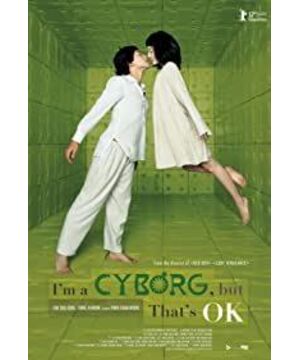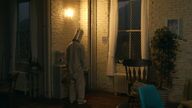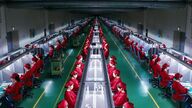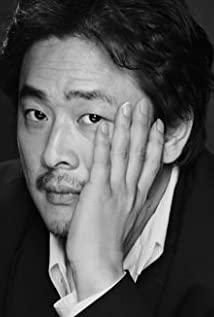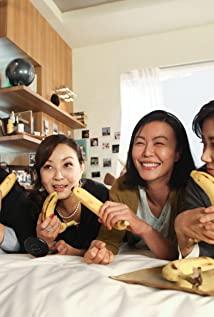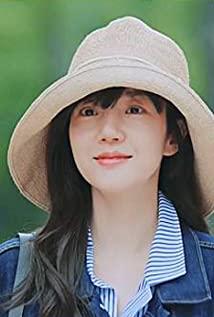At the Berlin Film Festival in 2007, there was a Korean director Park Chan-wook's entry "Robots Don't Matter" (cyborgs don't matter or recreate humans). Love), won the Alfred Award, and the film starred Rain and the lovely Lim Soo-kyung. The director, who has always been fond of violence, blood, and revenge, gave up the style he was good at in this film and made it fresh and humorous. Although there are still some gloomy elements in the film, on the whole, this is a fun and entertaining film. Movies that make people feel optimistic.
This imaginative film takes place in a mental hospital. The patients in the mental hospital are undoubtedly the purest people in the world. They have no scheming, they are happy for their own happiness, they suffer for their own pain, and there are people who work hard for the happiness of others. That is Rain. The descriptions of all the patients in the film fully demonstrate the quirky and humorous imagination of the Koreans. As soon as the lovely Lin Xiujing entered the hospital, a kind woman pushed her around and introduced the patients here one by one. Among the patients she introduced, there were cattle fetishes and transvestites who were gang-raped in the army and put themselves in the anus. Sewn on... When everyone thought this woman was a nurse in the hospital or something, the doctor came over and accused her, it turned out that she was a liar. These are easily reminiscent of the cartoon-like images of patients in "One Flew Over the Cuckoo's Nest", but the description and characterization of the symptoms and psychology of most of the patients in "One Flew Over the Cuckoo's Nest" are not as profound as "Flying Over the Cuckoo's Nest". Much of the image setting is to add to the film's comedy, as it's not as heavy on the subject as One Flew Over the Cuckoo's Nest.
The film tells the story of a girl with obsessive-compulsive disorder who thinks she is a robot, refuses to eat, goes to the hospital for treatment, and finally resumes eating with the help of a boy with "vanishing fear" (fear of disappearing), And to some extent optimistic again. However, the director did not set a plot for the girl to eliminate her obsessive-compulsive disorder. She still thinks she is a robot, but in the end, she is willing to eat and gradually walks out of the shadow of losing her grandmother. Her grandmother is also a mental patient. She is the only one who is close to her at home. When her grandmother was taken away by a car in the mental hospital, she chased after her on a bicycle to give her dentures, but she didn't catch up, so she blamed herself The "power" is insufficient, and the shadow has always accompanied her. Later, she saw her grandmother in a fantasy created by Rain and her, and her shadow was also eliminated. This fantasy is not the only fantasy in the film, these imaginative fantasy is a manifestation of the fairy tale temperament of the film. There was also a beautiful girl patient who could sing, and at one point reminded me of "The Sound of Music" when she sang beautiful songs in that grassy phantom.
The director didn't let the lovely Lin Xiujing's obsessive-compulsive disorder heal, but she was willing to eat and got rid of the shadow. What's the point of being a robot? The director's setting is probably to convey a more humane concept. In order to treat these simple mentally ill people, electric shocks, confinement, force-feeding and various cruel methods that we don't know about are used. Is this right? Is this good for the mentally ill? How unreasonable this is. These patients are very simple, as long as they feel happy, the robot does not matter. Therefore, although the doctors in this movie are not so vivid, they are by no means the "white horror" psychiatrists we know from other movies (or literary works), they are most of the time. Kindly, this mental hospital is not as dark and cold as a cage or a prison, but a garden with colorful colors. These are probably what the director wants us to think about, and the colorful and fresh colors in this film are also another embodiment of its fairy tale temperament.
When the lovely Lin Xiujing first arrived at the hospital, she not only hid her psychology from the doctor, but also did not eat. Later, Rain knew that she was afraid that eating would damage her body (machine), so she thought of a way, Rain gave her Inside the body is a device that converts rice into electrical energy, using a small box with a photo of his mother. In fact, Rain rationally understood the lovely Lin Xiujing's illness at this time, and he didn't install that device in her body, but the hint to her was that he clearly installed it again. He didn't deny her psychology, this is the respect among the patients. The lovely Lin Xiujing finally ate, and we could see that the device was also working magically in her body. Rain also has a stealing technique. He stole the skills of a table tennis champion, stole a little boy's waistband, stole food from a fat woman's belly, stole a lying woman's memory, stole... At the pleas of the lovely Lin Xiujing Next, he stole her sympathy, so she wouldn't be sad because she missed her grandma, and later he stole the fat woman's flying shoes and flew to meet her grandma. These magical props (electricity converters, flying shoes, etc.) and imaginative plots (stealing empathy, flying, and Rain's often-changing playful masks, cute Lin Xiujing talking to fluorescent lights and automatic coffee machines) scene, etc.), which is also the embodiment of the fairy tale temperament of this movie.
Of course, fairy tales are of course indispensable to the pure love between the prince and the princess. When the lovely Lin Xiujing asked Rain what if the device in her body broke down, Rain said that he was a mechanic and he would fix it, and the lovely Lin Xiujing asked if he was not around. , Rain said, of course I've been by your side, and we knew they were in love. And the little box with his mother's photo, which he cherished most, has been buried in front of grandma's grave together with her grandma's most cherished dentures.
The performances of all the actors in this film are bizarre, because the story takes place in a mental hospital, and the thoughts of these patients are by no means what normal people like me can infer, and these actors—probably They're all professional actors - they understand this very well and do it very well. This quirky performance also makes these patients even more endearing.
This kind of inspirational and uncertain performance is what Japanese and Korean actors are good at, and the quirky plot in this film also makes this kind of performance play out more thoroughly. This is naturally another manifestation of the fairy tale temperament of the film.
Even if it's not the story of the mental hospital, there are many such inspirational performances in many Japanese and Korean movies, and these are shown more in those actresses, which also makes the heroines in Japanese and Korean movies more intriguing and lovely. Lee Young-ae (played as a radio producer) in "Spring Die", Suzuki Kyo (played as Arai Hana) and Aoi Yu (played by Alice) in "Flower and Alice", "My Sassy Girl" Jeon Ji-hyun (played as a savage girlfriend), and Haruka Ayase (played by Aki) in "Calling for Love in the Center of the World", these heroines are all elusive and aura girls.
What I have to mention is that in Chinese movies, there are almost never such performances. Even Zhou Xun, who is known as quirky, still seems to be more than a little bit pretentious in her interpretation of various quirky characters. And all of this is due to the poisoning of Stella's junk realist performance theory. In the performance education of the top drama, film and television academies in China, the experiential theory of Stanislavsky, a master of performance (education) theory in the former Soviet Union, has always been the foundation of performance education in these academies, thus making Chinese actors No more realism. According to the theory of this master Stanislaus, all performances are based on life. All actors' lines and physical movements, under the premise of synthesizing all the situations at that time (character psychology, scene atmosphere, quantity changes, etc.), are able to Inferred by logic, and according to this theory, all performances full of inspiration and uncertainty are absurd and unacceptable. He never considers the contingency factor in human thought, especially the contingency of the uncertain animal like woman.
Because of the long-term acceptance of Si's theory, and the serious lack of creativity of Chinese actresses to transform it, Chinese films have never had inspirational performances. Si Shi is not completely wrong, because to subvert any artistic creation under any trend of thought, it must be based on a familiarity with this trend of thought. Therefore, there are a large part of the reasons for the lack of this type of performance in China. Due to the poor education of the acting teachers who lack guidance and the lack of subversive creativity of the actors themselves.
In the overall fresh and comedic style of the film, the director still deliberately or unintentionally added some elements of blood and violence that he used to love, like the lovely Lin Xiujing (in fantasy) when he shot and killed the doctors. Blood spurted. This also has some kind of coincidence with Western fairy tale movies. Gloom may not be what fairy tales are meant to promote, but gloom can undoubtedly bring a fairy-tale mysterious and strong color to the movie, which has the magic and gothic temperament of those movies. In the mysterious soil of Latin America, from García Márquez's novel "One Hundred Years of Solitude" (Colombia) to the recent Guillermo del Toro film "Pan's Labyrinth" (Mexico), the magic is almost To be a part of the lives of people in this land is a magic with a rich cultural tradition that is unmatched and unmatched by any other part of the world. In this "Pan's Labyrinth", Del Toro once again showed us the charm of Latin American magic, and also showed the magical and rich imagination that a child should have in his mind. Is he also explaining to us? , only they can make the purest fairy tale movie? When a more magical "Baby in Love" appeared in China, the Chinese expressed their incomprehension with their dirty thinking, and added vicious words. How can this inspiring and passionate film be understood by these stupid people! I'll go to you more than 100 uncles!
Goth is the mystery and gloom of the castle, so it has become another important factor in fairy tale movies. Pale, neurotic, melancholy and many other gothic features can be seen in Tim Burton's "Edward Scissorhands" One spot.
The above is just to illustrate the point, the gloomy element is the catalyst for magic and goth. Strange shapes, dark tones, blood and violence do not prevent a movie from becoming a fairy tale movie. In fact, those protagonists have a pure, transparent and fragile heart. Like a child, Ophelia in the fantasy labyrinth is like this, Edward Scissorhands is like this, so is the lovely Lin Xiujing, even Rain and those patients are like this.
Fairy tale movies have never been good at oriental culture, and fairy tale movies rarely appear in oriental movies. Many people are called movies with fairy tale love, which does not mean that this is a fairy tale movie, but only represents people. The yearning for a beautiful love, my favorite "Flower and Alice" is like this. "It Doesn't Matter With Robots" has many elements of fairy tale movies, so it can be said to be an oriental fairy tale movie.
View more about I'm a Cyborg, But That's OK reviews


